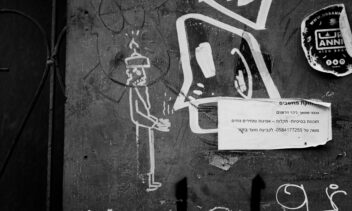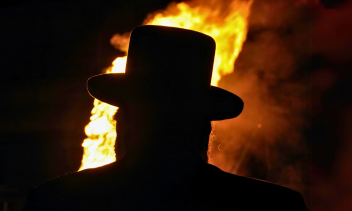I grew up in a religious home. All my friends were religious. All my teachers were religious. But even as a child, I was always aware of people who were not observant. Most of my extended family, in fact, were not religiously observant. My father grew up in a small town in Massachusetts, called North Adams, and was really the outlier among his peers when he decided to become more observant as a young teenager. I grew up loving and admiring my extended relatives. When differences in observance, which can be difficult for a child to understand, became apparent, my mother would explain that they were not afforded a Jewish education. Indeed, for many, one’s early experiences in Jewish education play an oversized role in later-in-life religious observance. As I matured, I began to understand that religious affiliation, like all aspects of our identity, evolve, devolve, change, and transform as we grow up. Instead of looking at religious affiliation like a binary yes or no question, I began to see religious identity as shades of color along a spectrum of a lifelong relationship which, like any relationship, has good times and bad.
The head of the yeshiva, realizing that the rebellious students inside did not have enough food to sustain them, would throw challah rolls to them through an open window. Even outside, he still cared.
The first time I saw a formal consideration of the phenomenon of people leaving religious life, I was fourteen years old. The Jewish Observer, the magazine of Agudath Israel, dedicated an entire issue to the subject alarmingly titled, “Children on the Fringe and Beyond.” In many ways the issue was typical of much of the media coverage of the issue that would follow in later years: sensational, concerning, and somewhat hysterical. The introduction to the special issue included the following contrast to previous generations’ struggle with children leaving religion:
In contrast to other times and places when poverty was rampant, the threat of pogroms and persecution hung heavy in the air, or exciting “new” ideologies pulled at Jewish youth, American Jewry today lives in serenity and contentment, enjoys great prosperity and is not confronted by ideological challenge. In much of Europe and Israel, defections from Torah were accompanied by an attempt at philosophical rationalization. Today’s slide downward generally does not include even the flimsiest ideological veneer. (Introduction, Rabbi Eliyahu Meir Klugman).
At the time, this characterization resonated with me in most ways. People who were leaving their traditional education announced it with grungy clothes, Marilyn Manson posters, and cigarettes. It was the nineties. To be sure, The Jewish Observer was careful not to assign blame:
It is not our task to assign blame, point fingers, or self-assuredly maintain that there are conclusive answers. Every child is different and no two situations are alike. But there are risk factors, and there are areas that bear improvement.
There are several important articles in the issue. When I first read it as a fourteen-year-old, I was drawn to one. I still think it is the most important article in the issue. Written by Rabbi Yitzchok Mitnick, founder of the popular Brooklyn teen center “Our Place,” he describes the reality for many teens who feel deflected from Jewish life. If you can ignore the nineties slang throughout the article (e.g. “whassup,” “chillin”), it is quite uplifting. In the article he tells a story about a group of teens throwing a party while their parents are out of town. Local Jewish educators stop by to make sure they have food for Shabbos. It’s an important model for the continued connection the Jewish community needs even with those who may no longer be inside. It reminds me of a story Professor Shaul Stampfer once told me. Professor Stampfer wrote about the history of European Yeshivot. A few years ago I got together with him and asked him what was the most inspiring story he heard while researching the history of the yeshiva. I loved his answer. He said there was a student mutiny at Telz yeshiva. The students took over the yeshiva and locked out all of the administrators. The head of the yeshiva, realizing that the rebellious students inside did not have enough food to sustain them, would throw challah rolls to them through an open window. Even outside, he still cared.
The Jewish Observer issue doesn’t offer much in the way of solutions, nor does it pretend to. Religious engagement has no hard and fast rules, he explains, “[it] is not a board game.”
Overall, the issue was a communal breakthrough moment. It saw an issue that previously had been ignored, and shed light on a persistent but always changing phenomenon. Six years after the Jewish Observer issue, Faranak Margolese published a book Off the Derech, that also explored the phenomenon. She begins by citing the Jewish Observer issue.
The discussions that follow consider the phenomenon of some people leaving their religious upbringing and, hopefully, in the course of understanding the story of why they left, we may better appreciate why most stay.
Tune in to our introductory podcast for OTD.








